Organisational Behaviour Analysis: Power, Culture and Team Performance
VerifiedAdded on 2023/06/06
|15
|4915
|266
Report
AI Summary
This report provides an analysis of organisational behaviour within Asda, a British supermarket chain, focusing on the influence of organisational power, politics, and culture on both team and individual behaviour and performance. It evaluates content and process theories of motivation, including Maslow's hierarchy of needs, Herzberg's two-factor theory, Vroom's expectancy theory, and goal-setting theory, to understand how motivational techniques can enable organisational goal achievement. The report differentiates between effective and ineffective teams, highlighting the characteristics and factors that contribute to team success. Furthermore, it applies concepts and philosophies of organisational behaviour to Asda's business situation, examining the impact of power, culture, and politics on employee productivity and workplace environment. The analysis utilizes Handy's cultural typology model to assess Asda's organisational culture. Ultimately, the report aims to provide insights into enhancing team and individual performance through a better understanding of organisational behaviour principles.

Organisation behaviour
Paraphrase This Document
Need a fresh take? Get an instant paraphrase of this document with our AI Paraphraser
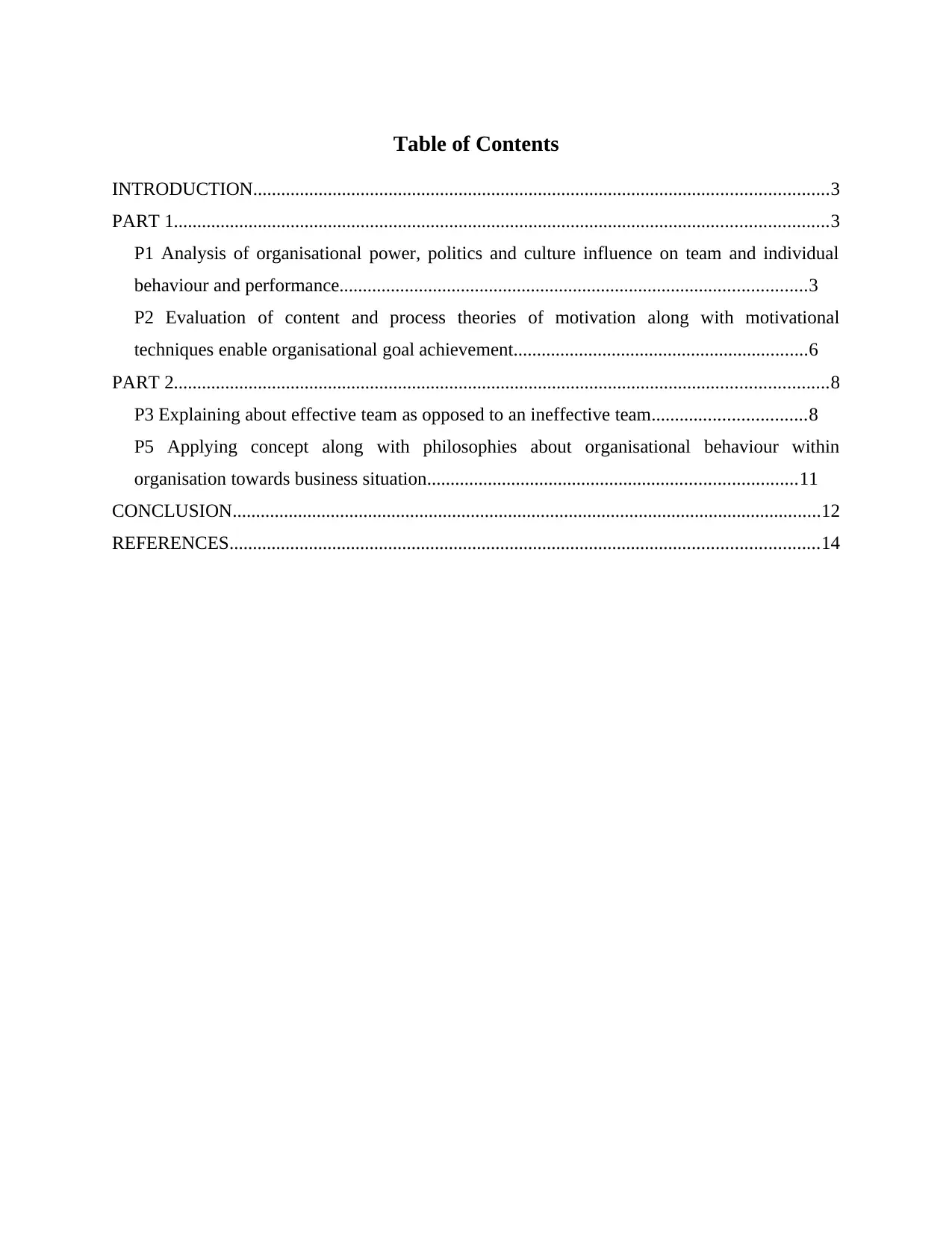
Table of Contents
INTRODUCTION...........................................................................................................................3
PART 1............................................................................................................................................3
P1 Analysis of organisational power, politics and culture influence on team and individual
behaviour and performance....................................................................................................3
P2 Evaluation of content and process theories of motivation along with motivational
techniques enable organisational goal achievement...............................................................6
PART 2............................................................................................................................................8
P3 Explaining about effective team as opposed to an ineffective team.................................8
P5 Applying concept along with philosophies about organisational behaviour within
organisation towards business situation...............................................................................11
CONCLUSION..............................................................................................................................12
REFERENCES..............................................................................................................................14
INTRODUCTION...........................................................................................................................3
PART 1............................................................................................................................................3
P1 Analysis of organisational power, politics and culture influence on team and individual
behaviour and performance....................................................................................................3
P2 Evaluation of content and process theories of motivation along with motivational
techniques enable organisational goal achievement...............................................................6
PART 2............................................................................................................................................8
P3 Explaining about effective team as opposed to an ineffective team.................................8
P5 Applying concept along with philosophies about organisational behaviour within
organisation towards business situation...............................................................................11
CONCLUSION..............................................................................................................................12
REFERENCES..............................................................................................................................14
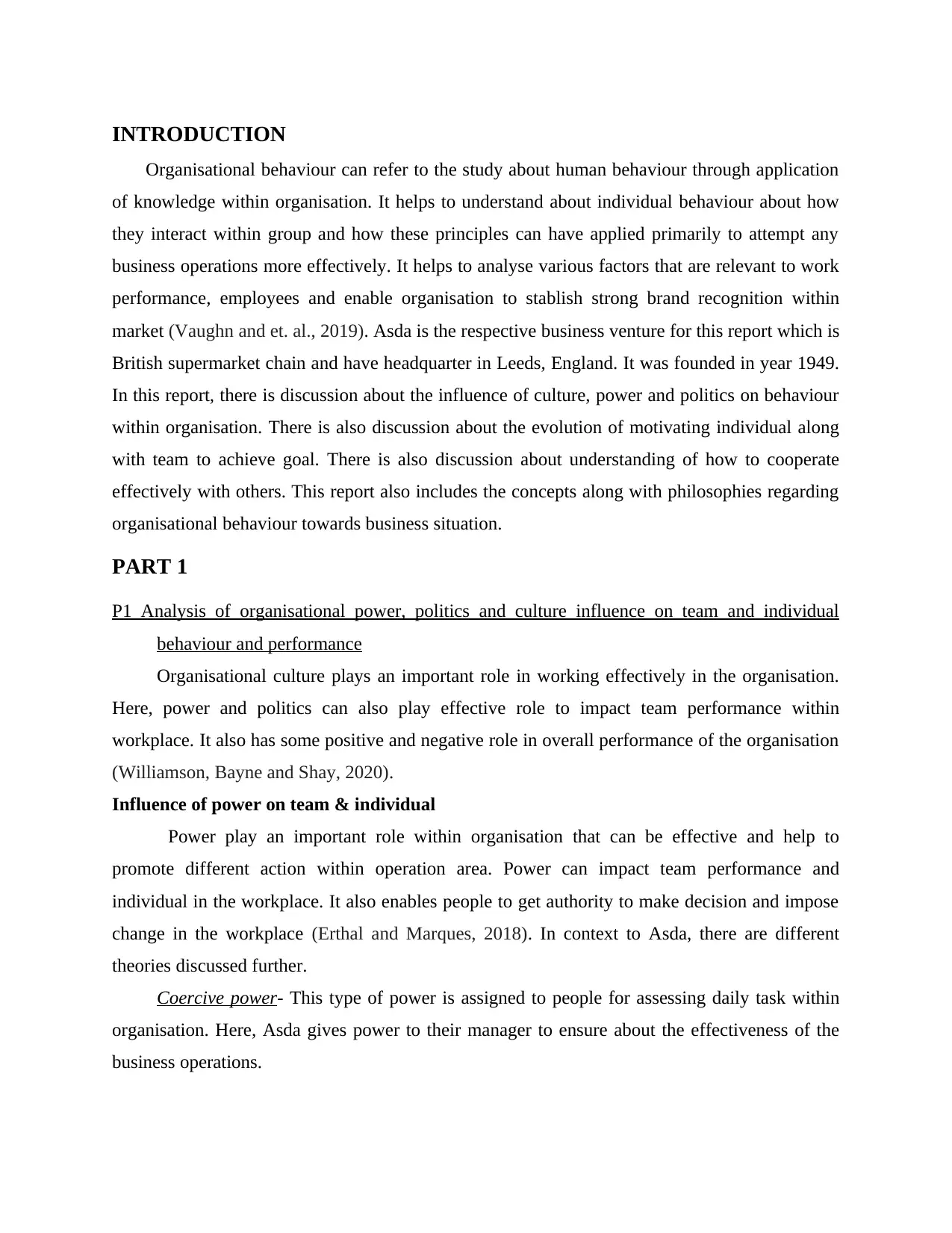
INTRODUCTION
Organisational behaviour can refer to the study about human behaviour through application
of knowledge within organisation. It helps to understand about individual behaviour about how
they interact within group and how these principles can have applied primarily to attempt any
business operations more effectively. It helps to analyse various factors that are relevant to work
performance, employees and enable organisation to stablish strong brand recognition within
market (Vaughn and et. al., 2019). Asda is the respective business venture for this report which is
British supermarket chain and have headquarter in Leeds, England. It was founded in year 1949.
In this report, there is discussion about the influence of culture, power and politics on behaviour
within organisation. There is also discussion about the evolution of motivating individual along
with team to achieve goal. There is also discussion about understanding of how to cooperate
effectively with others. This report also includes the concepts along with philosophies regarding
organisational behaviour towards business situation.
PART 1
P1 Analysis of organisational power, politics and culture influence on team and individual
behaviour and performance
Organisational culture plays an important role in working effectively in the organisation.
Here, power and politics can also play effective role to impact team performance within
workplace. It also has some positive and negative role in overall performance of the organisation
(Williamson, Bayne and Shay, 2020).
Influence of power on team & individual
Power play an important role within organisation that can be effective and help to
promote different action within operation area. Power can impact team performance and
individual in the workplace. It also enables people to get authority to make decision and impose
change in the workplace (Erthal and Marques, 2018). In context to Asda, there are different
theories discussed further.
Coercive power- This type of power is assigned to people for assessing daily task within
organisation. Here, Asda gives power to their manager to ensure about the effectiveness of the
business operations.
Organisational behaviour can refer to the study about human behaviour through application
of knowledge within organisation. It helps to understand about individual behaviour about how
they interact within group and how these principles can have applied primarily to attempt any
business operations more effectively. It helps to analyse various factors that are relevant to work
performance, employees and enable organisation to stablish strong brand recognition within
market (Vaughn and et. al., 2019). Asda is the respective business venture for this report which is
British supermarket chain and have headquarter in Leeds, England. It was founded in year 1949.
In this report, there is discussion about the influence of culture, power and politics on behaviour
within organisation. There is also discussion about the evolution of motivating individual along
with team to achieve goal. There is also discussion about understanding of how to cooperate
effectively with others. This report also includes the concepts along with philosophies regarding
organisational behaviour towards business situation.
PART 1
P1 Analysis of organisational power, politics and culture influence on team and individual
behaviour and performance
Organisational culture plays an important role in working effectively in the organisation.
Here, power and politics can also play effective role to impact team performance within
workplace. It also has some positive and negative role in overall performance of the organisation
(Williamson, Bayne and Shay, 2020).
Influence of power on team & individual
Power play an important role within organisation that can be effective and help to
promote different action within operation area. Power can impact team performance and
individual in the workplace. It also enables people to get authority to make decision and impose
change in the workplace (Erthal and Marques, 2018). In context to Asda, there are different
theories discussed further.
Coercive power- This type of power is assigned to people for assessing daily task within
organisation. Here, Asda gives power to their manager to ensure about the effectiveness of the
business operations.
⊘ This is a preview!⊘
Do you want full access?
Subscribe today to unlock all pages.

Trusted by 1+ million students worldwide
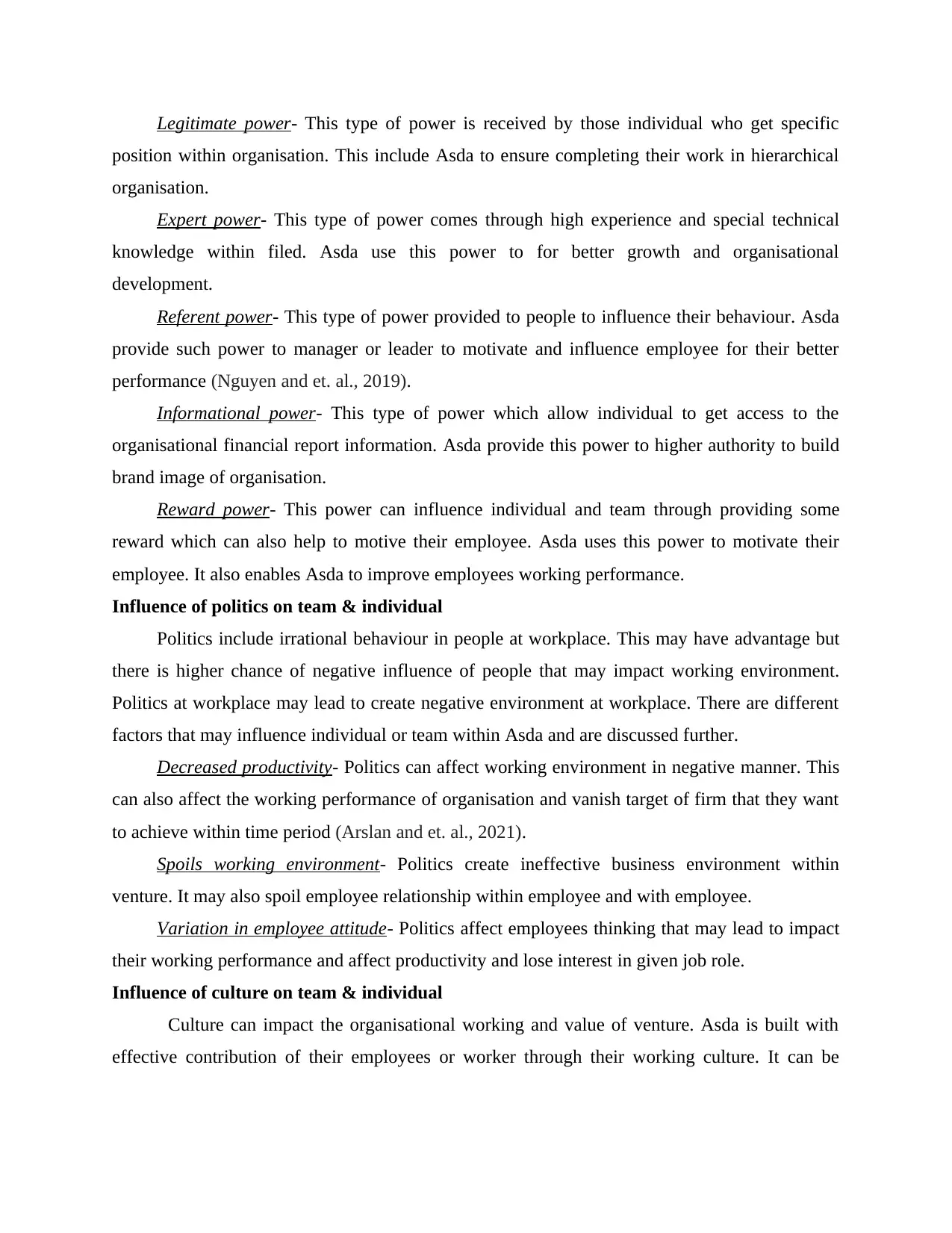
Legitimate power- This type of power is received by those individual who get specific
position within organisation. This include Asda to ensure completing their work in hierarchical
organisation.
Expert power- This type of power comes through high experience and special technical
knowledge within filed. Asda use this power to for better growth and organisational
development.
Referent power- This type of power provided to people to influence their behaviour. Asda
provide such power to manager or leader to motivate and influence employee for their better
performance (Nguyen and et. al., 2019).
Informational power- This type of power which allow individual to get access to the
organisational financial report information. Asda provide this power to higher authority to build
brand image of organisation.
Reward power- This power can influence individual and team through providing some
reward which can also help to motive their employee. Asda uses this power to motivate their
employee. It also enables Asda to improve employees working performance.
Influence of politics on team & individual
Politics include irrational behaviour in people at workplace. This may have advantage but
there is higher chance of negative influence of people that may impact working environment.
Politics at workplace may lead to create negative environment at workplace. There are different
factors that may influence individual or team within Asda and are discussed further.
Decreased productivity- Politics can affect working environment in negative manner. This
can also affect the working performance of organisation and vanish target of firm that they want
to achieve within time period (Arslan and et. al., 2021).
Spoils working environment- Politics create ineffective business environment within
venture. It may also spoil employee relationship within employee and with employee.
Variation in employee attitude- Politics affect employees thinking that may lead to impact
their working performance and affect productivity and lose interest in given job role.
Influence of culture on team & individual
Culture can impact the organisational working and value of venture. Asda is built with
effective contribution of their employees or worker through their working culture. It can be
position within organisation. This include Asda to ensure completing their work in hierarchical
organisation.
Expert power- This type of power comes through high experience and special technical
knowledge within filed. Asda use this power to for better growth and organisational
development.
Referent power- This type of power provided to people to influence their behaviour. Asda
provide such power to manager or leader to motivate and influence employee for their better
performance (Nguyen and et. al., 2019).
Informational power- This type of power which allow individual to get access to the
organisational financial report information. Asda provide this power to higher authority to build
brand image of organisation.
Reward power- This power can influence individual and team through providing some
reward which can also help to motive their employee. Asda uses this power to motivate their
employee. It also enables Asda to improve employees working performance.
Influence of politics on team & individual
Politics include irrational behaviour in people at workplace. This may have advantage but
there is higher chance of negative influence of people that may impact working environment.
Politics at workplace may lead to create negative environment at workplace. There are different
factors that may influence individual or team within Asda and are discussed further.
Decreased productivity- Politics can affect working environment in negative manner. This
can also affect the working performance of organisation and vanish target of firm that they want
to achieve within time period (Arslan and et. al., 2021).
Spoils working environment- Politics create ineffective business environment within
venture. It may also spoil employee relationship within employee and with employee.
Variation in employee attitude- Politics affect employees thinking that may lead to impact
their working performance and affect productivity and lose interest in given job role.
Influence of culture on team & individual
Culture can impact the organisational working and value of venture. Asda is built with
effective contribution of their employees or worker through their working culture. It can be
Paraphrase This Document
Need a fresh take? Get an instant paraphrase of this document with our AI Paraphraser
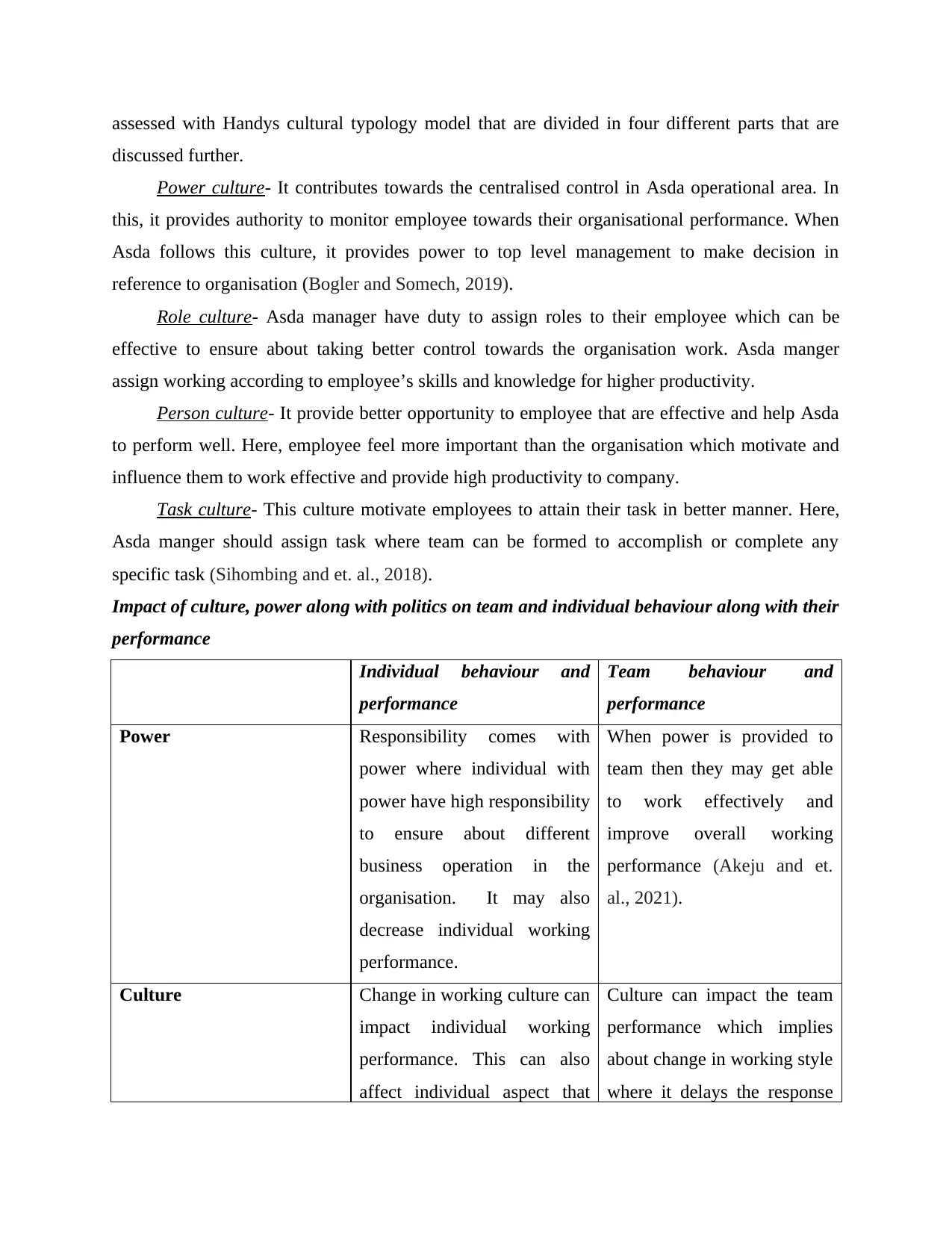
assessed with Handys cultural typology model that are divided in four different parts that are
discussed further.
Power culture- It contributes towards the centralised control in Asda operational area. In
this, it provides authority to monitor employee towards their organisational performance. When
Asda follows this culture, it provides power to top level management to make decision in
reference to organisation (Bogler and Somech, 2019).
Role culture- Asda manager have duty to assign roles to their employee which can be
effective to ensure about taking better control towards the organisation work. Asda manger
assign working according to employee’s skills and knowledge for higher productivity.
Person culture- It provide better opportunity to employee that are effective and help Asda
to perform well. Here, employee feel more important than the organisation which motivate and
influence them to work effective and provide high productivity to company.
Task culture- This culture motivate employees to attain their task in better manner. Here,
Asda manger should assign task where team can be formed to accomplish or complete any
specific task (Sihombing and et. al., 2018).
Impact of culture, power along with politics on team and individual behaviour along with their
performance
Individual behaviour and
performance
Team behaviour and
performance
Power Responsibility comes with
power where individual with
power have high responsibility
to ensure about different
business operation in the
organisation. It may also
decrease individual working
performance.
When power is provided to
team then they may get able
to work effectively and
improve overall working
performance (Akeju and et.
al., 2021).
Culture Change in working culture can
impact individual working
performance. This can also
affect individual aspect that
Culture can impact the team
performance which implies
about change in working style
where it delays the response
discussed further.
Power culture- It contributes towards the centralised control in Asda operational area. In
this, it provides authority to monitor employee towards their organisational performance. When
Asda follows this culture, it provides power to top level management to make decision in
reference to organisation (Bogler and Somech, 2019).
Role culture- Asda manager have duty to assign roles to their employee which can be
effective to ensure about taking better control towards the organisation work. Asda manger
assign working according to employee’s skills and knowledge for higher productivity.
Person culture- It provide better opportunity to employee that are effective and help Asda
to perform well. Here, employee feel more important than the organisation which motivate and
influence them to work effective and provide high productivity to company.
Task culture- This culture motivate employees to attain their task in better manner. Here,
Asda manger should assign task where team can be formed to accomplish or complete any
specific task (Sihombing and et. al., 2018).
Impact of culture, power along with politics on team and individual behaviour along with their
performance
Individual behaviour and
performance
Team behaviour and
performance
Power Responsibility comes with
power where individual with
power have high responsibility
to ensure about different
business operation in the
organisation. It may also
decrease individual working
performance.
When power is provided to
team then they may get able
to work effectively and
improve overall working
performance (Akeju and et.
al., 2021).
Culture Change in working culture can
impact individual working
performance. This can also
affect individual aspect that
Culture can impact the team
performance which implies
about change in working style
where it delays the response
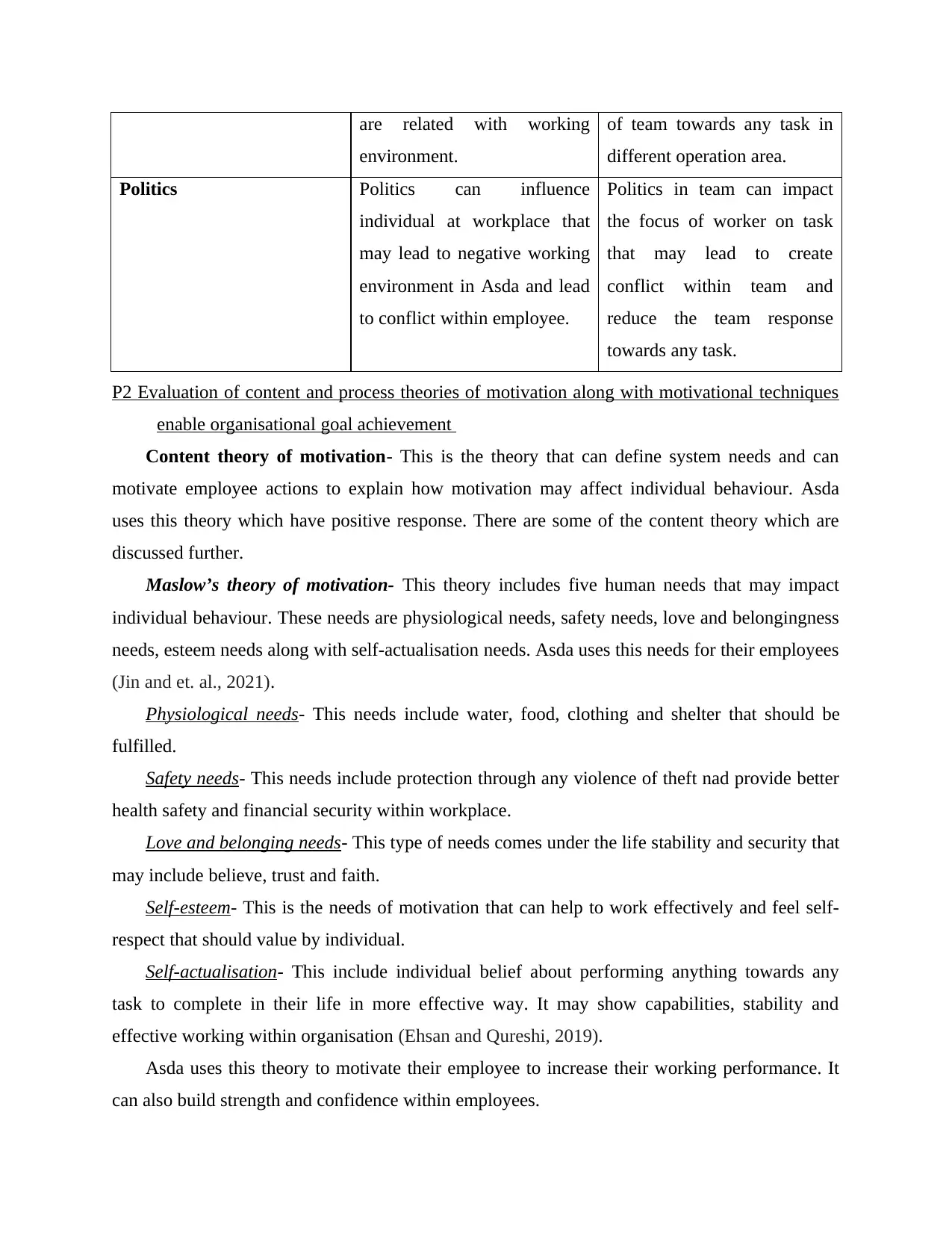
are related with working
environment.
of team towards any task in
different operation area.
Politics Politics can influence
individual at workplace that
may lead to negative working
environment in Asda and lead
to conflict within employee.
Politics in team can impact
the focus of worker on task
that may lead to create
conflict within team and
reduce the team response
towards any task.
P2 Evaluation of content and process theories of motivation along with motivational techniques
enable organisational goal achievement
Content theory of motivation- This is the theory that can define system needs and can
motivate employee actions to explain how motivation may affect individual behaviour. Asda
uses this theory which have positive response. There are some of the content theory which are
discussed further.
Maslow’s theory of motivation- This theory includes five human needs that may impact
individual behaviour. These needs are physiological needs, safety needs, love and belongingness
needs, esteem needs along with self-actualisation needs. Asda uses this needs for their employees
(Jin and et. al., 2021).
Physiological needs- This needs include water, food, clothing and shelter that should be
fulfilled.
Safety needs- This needs include protection through any violence of theft nad provide better
health safety and financial security within workplace.
Love and belonging needs- This type of needs comes under the life stability and security that
may include believe, trust and faith.
Self-esteem- This is the needs of motivation that can help to work effectively and feel self-
respect that should value by individual.
Self-actualisation- This include individual belief about performing anything towards any
task to complete in their life in more effective way. It may show capabilities, stability and
effective working within organisation (Ehsan and Qureshi, 2019).
Asda uses this theory to motivate their employee to increase their working performance. It
can also build strength and confidence within employees.
environment.
of team towards any task in
different operation area.
Politics Politics can influence
individual at workplace that
may lead to negative working
environment in Asda and lead
to conflict within employee.
Politics in team can impact
the focus of worker on task
that may lead to create
conflict within team and
reduce the team response
towards any task.
P2 Evaluation of content and process theories of motivation along with motivational techniques
enable organisational goal achievement
Content theory of motivation- This is the theory that can define system needs and can
motivate employee actions to explain how motivation may affect individual behaviour. Asda
uses this theory which have positive response. There are some of the content theory which are
discussed further.
Maslow’s theory of motivation- This theory includes five human needs that may impact
individual behaviour. These needs are physiological needs, safety needs, love and belongingness
needs, esteem needs along with self-actualisation needs. Asda uses this needs for their employees
(Jin and et. al., 2021).
Physiological needs- This needs include water, food, clothing and shelter that should be
fulfilled.
Safety needs- This needs include protection through any violence of theft nad provide better
health safety and financial security within workplace.
Love and belonging needs- This type of needs comes under the life stability and security that
may include believe, trust and faith.
Self-esteem- This is the needs of motivation that can help to work effectively and feel self-
respect that should value by individual.
Self-actualisation- This include individual belief about performing anything towards any
task to complete in their life in more effective way. It may show capabilities, stability and
effective working within organisation (Ehsan and Qureshi, 2019).
Asda uses this theory to motivate their employee to increase their working performance. It
can also build strength and confidence within employees.
⊘ This is a preview!⊘
Do you want full access?
Subscribe today to unlock all pages.

Trusted by 1+ million students worldwide
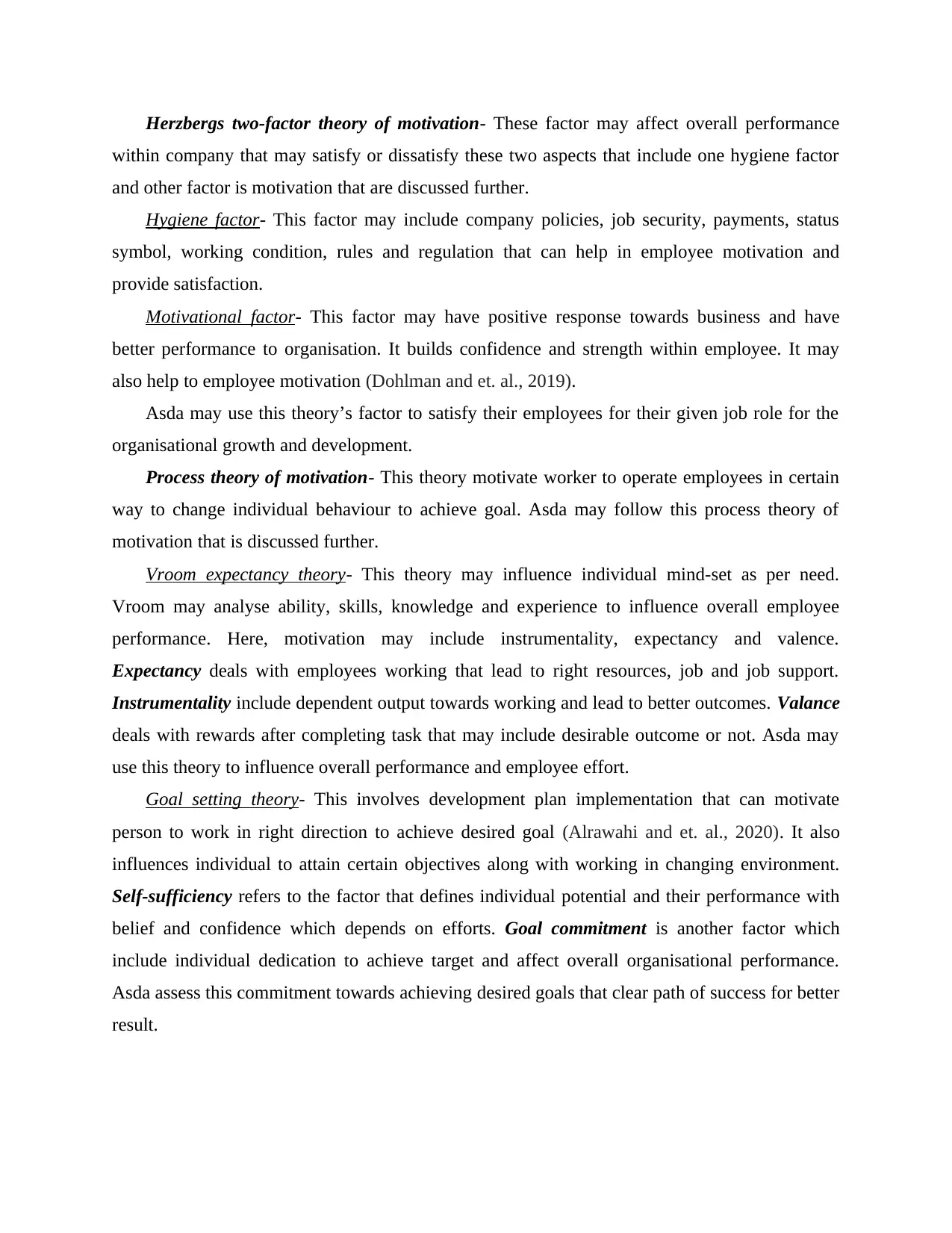
Herzbergs two-factor theory of motivation- These factor may affect overall performance
within company that may satisfy or dissatisfy these two aspects that include one hygiene factor
and other factor is motivation that are discussed further.
Hygiene factor- This factor may include company policies, job security, payments, status
symbol, working condition, rules and regulation that can help in employee motivation and
provide satisfaction.
Motivational factor- This factor may have positive response towards business and have
better performance to organisation. It builds confidence and strength within employee. It may
also help to employee motivation (Dohlman and et. al., 2019).
Asda may use this theory’s factor to satisfy their employees for their given job role for the
organisational growth and development.
Process theory of motivation- This theory motivate worker to operate employees in certain
way to change individual behaviour to achieve goal. Asda may follow this process theory of
motivation that is discussed further.
Vroom expectancy theory- This theory may influence individual mind-set as per need.
Vroom may analyse ability, skills, knowledge and experience to influence overall employee
performance. Here, motivation may include instrumentality, expectancy and valence.
Expectancy deals with employees working that lead to right resources, job and job support.
Instrumentality include dependent output towards working and lead to better outcomes. Valance
deals with rewards after completing task that may include desirable outcome or not. Asda may
use this theory to influence overall performance and employee effort.
Goal setting theory- This involves development plan implementation that can motivate
person to work in right direction to achieve desired goal (Alrawahi and et. al., 2020). It also
influences individual to attain certain objectives along with working in changing environment.
Self-sufficiency refers to the factor that defines individual potential and their performance with
belief and confidence which depends on efforts. Goal commitment is another factor which
include individual dedication to achieve target and affect overall organisational performance.
Asda assess this commitment towards achieving desired goals that clear path of success for better
result.
within company that may satisfy or dissatisfy these two aspects that include one hygiene factor
and other factor is motivation that are discussed further.
Hygiene factor- This factor may include company policies, job security, payments, status
symbol, working condition, rules and regulation that can help in employee motivation and
provide satisfaction.
Motivational factor- This factor may have positive response towards business and have
better performance to organisation. It builds confidence and strength within employee. It may
also help to employee motivation (Dohlman and et. al., 2019).
Asda may use this theory’s factor to satisfy their employees for their given job role for the
organisational growth and development.
Process theory of motivation- This theory motivate worker to operate employees in certain
way to change individual behaviour to achieve goal. Asda may follow this process theory of
motivation that is discussed further.
Vroom expectancy theory- This theory may influence individual mind-set as per need.
Vroom may analyse ability, skills, knowledge and experience to influence overall employee
performance. Here, motivation may include instrumentality, expectancy and valence.
Expectancy deals with employees working that lead to right resources, job and job support.
Instrumentality include dependent output towards working and lead to better outcomes. Valance
deals with rewards after completing task that may include desirable outcome or not. Asda may
use this theory to influence overall performance and employee effort.
Goal setting theory- This involves development plan implementation that can motivate
person to work in right direction to achieve desired goal (Alrawahi and et. al., 2020). It also
influences individual to attain certain objectives along with working in changing environment.
Self-sufficiency refers to the factor that defines individual potential and their performance with
belief and confidence which depends on efforts. Goal commitment is another factor which
include individual dedication to achieve target and affect overall organisational performance.
Asda assess this commitment towards achieving desired goals that clear path of success for better
result.
Paraphrase This Document
Need a fresh take? Get an instant paraphrase of this document with our AI Paraphraser
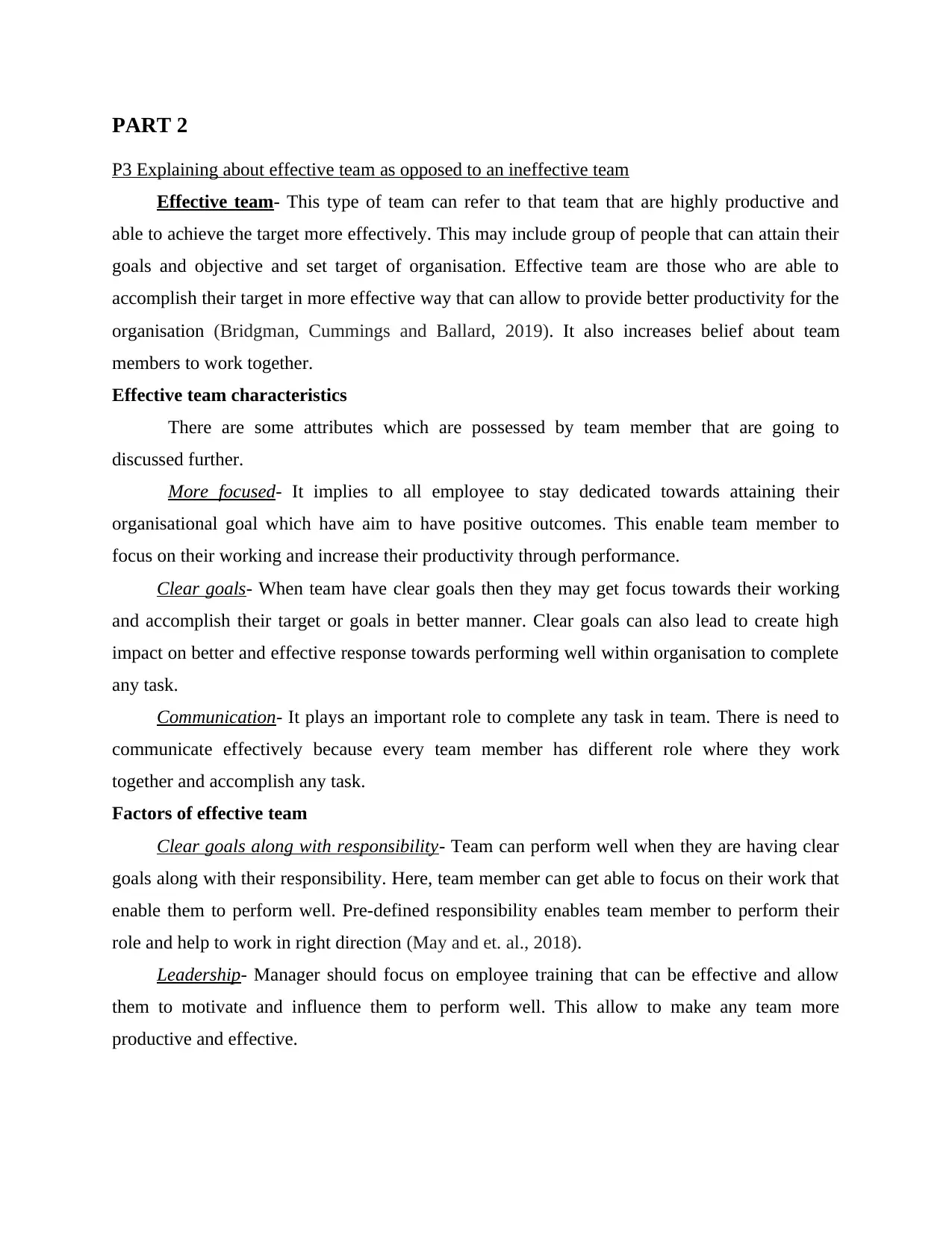
PART 2
P3 Explaining about effective team as opposed to an ineffective team
Effective team- This type of team can refer to that team that are highly productive and
able to achieve the target more effectively. This may include group of people that can attain their
goals and objective and set target of organisation. Effective team are those who are able to
accomplish their target in more effective way that can allow to provide better productivity for the
organisation (Bridgman, Cummings and Ballard, 2019). It also increases belief about team
members to work together.
Effective team characteristics
There are some attributes which are possessed by team member that are going to
discussed further.
More focused- It implies to all employee to stay dedicated towards attaining their
organisational goal which have aim to have positive outcomes. This enable team member to
focus on their working and increase their productivity through performance.
Clear goals- When team have clear goals then they may get focus towards their working
and accomplish their target or goals in better manner. Clear goals can also lead to create high
impact on better and effective response towards performing well within organisation to complete
any task.
Communication- It plays an important role to complete any task in team. There is need to
communicate effectively because every team member has different role where they work
together and accomplish any task.
Factors of effective team
Clear goals along with responsibility- Team can perform well when they are having clear
goals along with their responsibility. Here, team member can get able to focus on their work that
enable them to perform well. Pre-defined responsibility enables team member to perform their
role and help to work in right direction (May and et. al., 2018).
Leadership- Manager should focus on employee training that can be effective and allow
them to motivate and influence them to perform well. This allow to make any team more
productive and effective.
P3 Explaining about effective team as opposed to an ineffective team
Effective team- This type of team can refer to that team that are highly productive and
able to achieve the target more effectively. This may include group of people that can attain their
goals and objective and set target of organisation. Effective team are those who are able to
accomplish their target in more effective way that can allow to provide better productivity for the
organisation (Bridgman, Cummings and Ballard, 2019). It also increases belief about team
members to work together.
Effective team characteristics
There are some attributes which are possessed by team member that are going to
discussed further.
More focused- It implies to all employee to stay dedicated towards attaining their
organisational goal which have aim to have positive outcomes. This enable team member to
focus on their working and increase their productivity through performance.
Clear goals- When team have clear goals then they may get focus towards their working
and accomplish their target or goals in better manner. Clear goals can also lead to create high
impact on better and effective response towards performing well within organisation to complete
any task.
Communication- It plays an important role to complete any task in team. There is need to
communicate effectively because every team member has different role where they work
together and accomplish any task.
Factors of effective team
Clear goals along with responsibility- Team can perform well when they are having clear
goals along with their responsibility. Here, team member can get able to focus on their work that
enable them to perform well. Pre-defined responsibility enables team member to perform their
role and help to work in right direction (May and et. al., 2018).
Leadership- Manager should focus on employee training that can be effective and allow
them to motivate and influence them to perform well. This allow to make any team more
productive and effective.
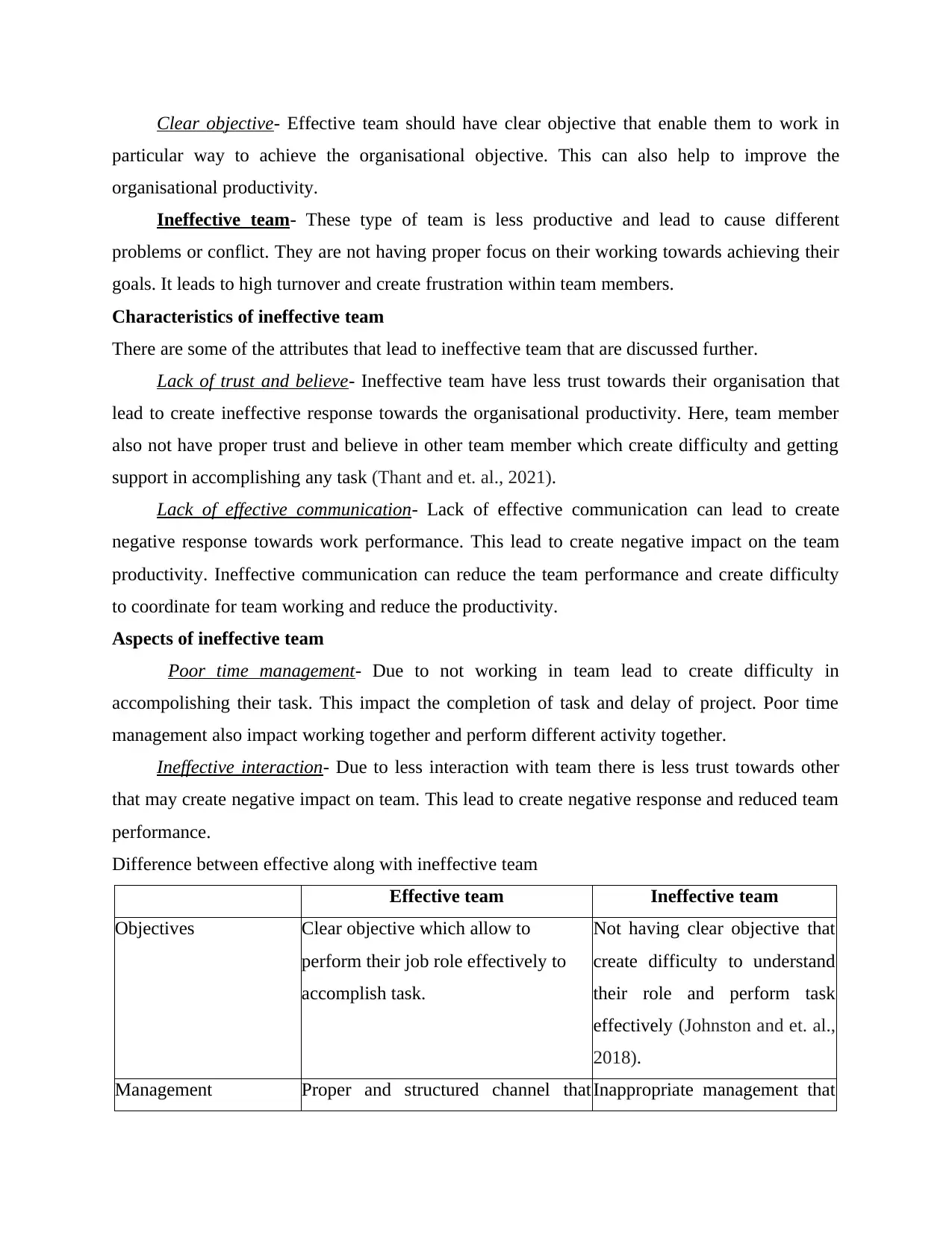
Clear objective- Effective team should have clear objective that enable them to work in
particular way to achieve the organisational objective. This can also help to improve the
organisational productivity.
Ineffective team- These type of team is less productive and lead to cause different
problems or conflict. They are not having proper focus on their working towards achieving their
goals. It leads to high turnover and create frustration within team members.
Characteristics of ineffective team
There are some of the attributes that lead to ineffective team that are discussed further.
Lack of trust and believe- Ineffective team have less trust towards their organisation that
lead to create ineffective response towards the organisational productivity. Here, team member
also not have proper trust and believe in other team member which create difficulty and getting
support in accomplishing any task (Thant and et. al., 2021).
Lack of effective communication- Lack of effective communication can lead to create
negative response towards work performance. This lead to create negative impact on the team
productivity. Ineffective communication can reduce the team performance and create difficulty
to coordinate for team working and reduce the productivity.
Aspects of ineffective team
Poor time management- Due to not working in team lead to create difficulty in
accompolishing their task. This impact the completion of task and delay of project. Poor time
management also impact working together and perform different activity together.
Ineffective interaction- Due to less interaction with team there is less trust towards other
that may create negative impact on team. This lead to create negative response and reduced team
performance.
Difference between effective along with ineffective team
Effective team Ineffective team
Objectives Clear objective which allow to
perform their job role effectively to
accomplish task.
Not having clear objective that
create difficulty to understand
their role and perform task
effectively (Johnston and et. al.,
2018).
Management Proper and structured channel that Inappropriate management that
particular way to achieve the organisational objective. This can also help to improve the
organisational productivity.
Ineffective team- These type of team is less productive and lead to cause different
problems or conflict. They are not having proper focus on their working towards achieving their
goals. It leads to high turnover and create frustration within team members.
Characteristics of ineffective team
There are some of the attributes that lead to ineffective team that are discussed further.
Lack of trust and believe- Ineffective team have less trust towards their organisation that
lead to create ineffective response towards the organisational productivity. Here, team member
also not have proper trust and believe in other team member which create difficulty and getting
support in accomplishing any task (Thant and et. al., 2021).
Lack of effective communication- Lack of effective communication can lead to create
negative response towards work performance. This lead to create negative impact on the team
productivity. Ineffective communication can reduce the team performance and create difficulty
to coordinate for team working and reduce the productivity.
Aspects of ineffective team
Poor time management- Due to not working in team lead to create difficulty in
accompolishing their task. This impact the completion of task and delay of project. Poor time
management also impact working together and perform different activity together.
Ineffective interaction- Due to less interaction with team there is less trust towards other
that may create negative impact on team. This lead to create negative response and reduced team
performance.
Difference between effective along with ineffective team
Effective team Ineffective team
Objectives Clear objective which allow to
perform their job role effectively to
accomplish task.
Not having clear objective that
create difficulty to understand
their role and perform task
effectively (Johnston and et. al.,
2018).
Management Proper and structured channel that Inappropriate management that
⊘ This is a preview!⊘
Do you want full access?
Subscribe today to unlock all pages.

Trusted by 1+ million students worldwide
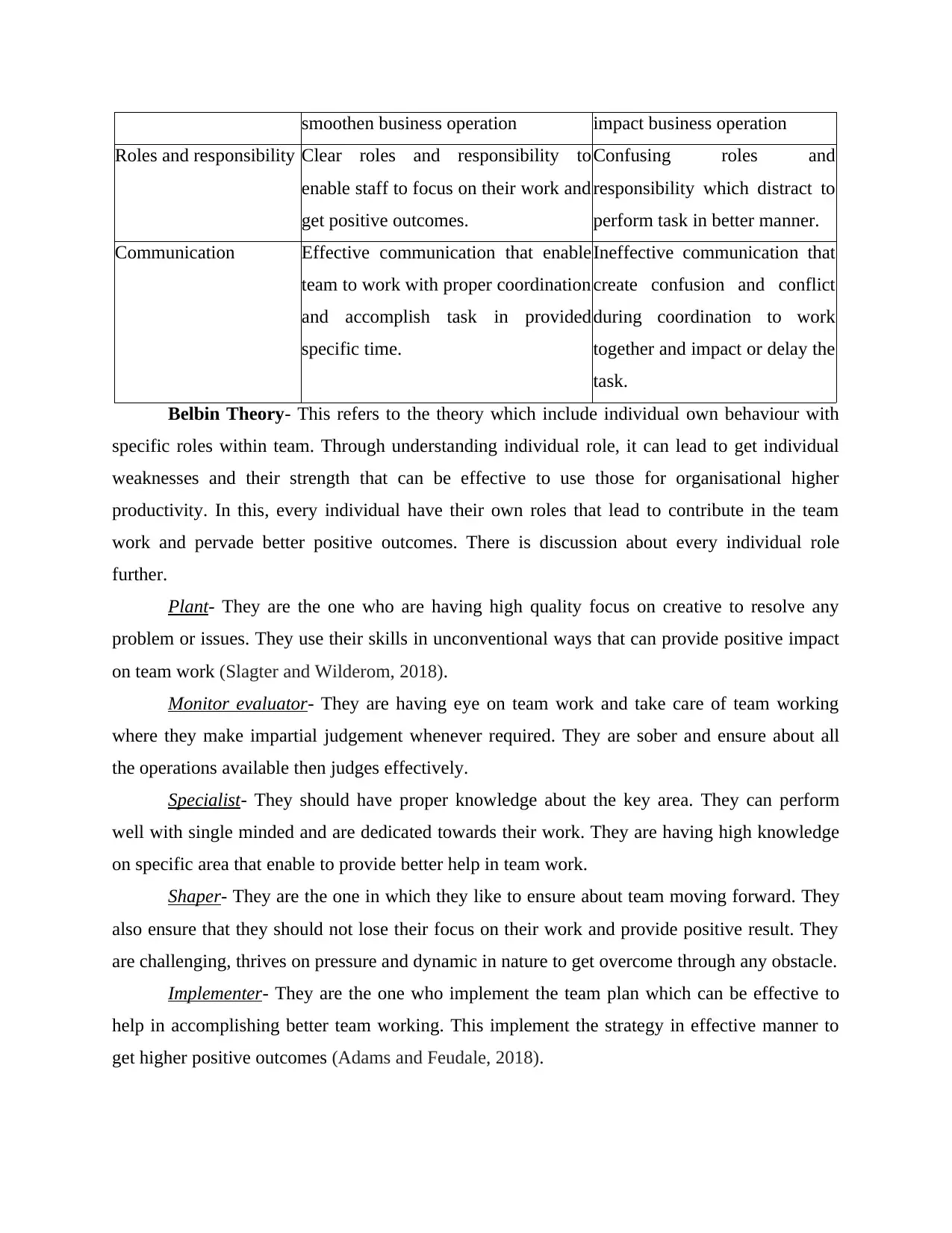
smoothen business operation impact business operation
Roles and responsibility Clear roles and responsibility to
enable staff to focus on their work and
get positive outcomes.
Confusing roles and
responsibility which distract to
perform task in better manner.
Communication Effective communication that enable
team to work with proper coordination
and accomplish task in provided
specific time.
Ineffective communication that
create confusion and conflict
during coordination to work
together and impact or delay the
task.
Belbin Theory- This refers to the theory which include individual own behaviour with
specific roles within team. Through understanding individual role, it can lead to get individual
weaknesses and their strength that can be effective to use those for organisational higher
productivity. In this, every individual have their own roles that lead to contribute in the team
work and pervade better positive outcomes. There is discussion about every individual role
further.
Plant- They are the one who are having high quality focus on creative to resolve any
problem or issues. They use their skills in unconventional ways that can provide positive impact
on team work (Slagter and Wilderom, 2018).
Monitor evaluator- They are having eye on team work and take care of team working
where they make impartial judgement whenever required. They are sober and ensure about all
the operations available then judges effectively.
Specialist- They should have proper knowledge about the key area. They can perform
well with single minded and are dedicated towards their work. They are having high knowledge
on specific area that enable to provide better help in team work.
Shaper- They are the one in which they like to ensure about team moving forward. They
also ensure that they should not lose their focus on their work and provide positive result. They
are challenging, thrives on pressure and dynamic in nature to get overcome through any obstacle.
Implementer- They are the one who implement the team plan which can be effective to
help in accomplishing better team working. This implement the strategy in effective manner to
get higher positive outcomes (Adams and Feudale, 2018).
Roles and responsibility Clear roles and responsibility to
enable staff to focus on their work and
get positive outcomes.
Confusing roles and
responsibility which distract to
perform task in better manner.
Communication Effective communication that enable
team to work with proper coordination
and accomplish task in provided
specific time.
Ineffective communication that
create confusion and conflict
during coordination to work
together and impact or delay the
task.
Belbin Theory- This refers to the theory which include individual own behaviour with
specific roles within team. Through understanding individual role, it can lead to get individual
weaknesses and their strength that can be effective to use those for organisational higher
productivity. In this, every individual have their own roles that lead to contribute in the team
work and pervade better positive outcomes. There is discussion about every individual role
further.
Plant- They are the one who are having high quality focus on creative to resolve any
problem or issues. They use their skills in unconventional ways that can provide positive impact
on team work (Slagter and Wilderom, 2018).
Monitor evaluator- They are having eye on team work and take care of team working
where they make impartial judgement whenever required. They are sober and ensure about all
the operations available then judges effectively.
Specialist- They should have proper knowledge about the key area. They can perform
well with single minded and are dedicated towards their work. They are having high knowledge
on specific area that enable to provide better help in team work.
Shaper- They are the one in which they like to ensure about team moving forward. They
also ensure that they should not lose their focus on their work and provide positive result. They
are challenging, thrives on pressure and dynamic in nature to get overcome through any obstacle.
Implementer- They are the one who implement the team plan which can be effective to
help in accomplishing better team working. This implement the strategy in effective manner to
get higher positive outcomes (Adams and Feudale, 2018).
Paraphrase This Document
Need a fresh take? Get an instant paraphrase of this document with our AI Paraphraser
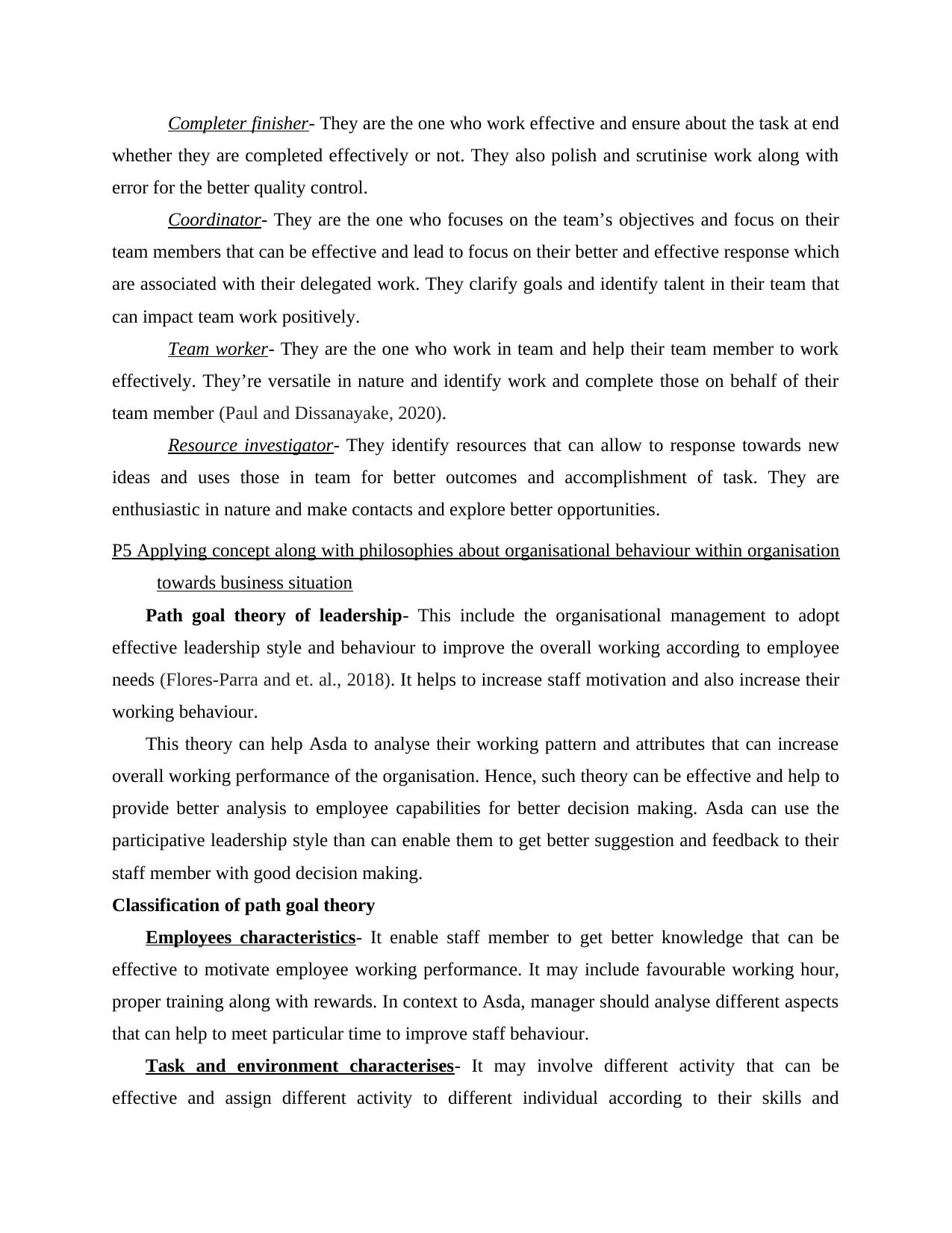
Completer finisher- They are the one who work effective and ensure about the task at end
whether they are completed effectively or not. They also polish and scrutinise work along with
error for the better quality control.
Coordinator- They are the one who focuses on the team’s objectives and focus on their
team members that can be effective and lead to focus on their better and effective response which
are associated with their delegated work. They clarify goals and identify talent in their team that
can impact team work positively.
Team worker- They are the one who work in team and help their team member to work
effectively. They’re versatile in nature and identify work and complete those on behalf of their
team member (Paul and Dissanayake, 2020).
Resource investigator- They identify resources that can allow to response towards new
ideas and uses those in team for better outcomes and accomplishment of task. They are
enthusiastic in nature and make contacts and explore better opportunities.
P5 Applying concept along with philosophies about organisational behaviour within organisation
towards business situation
Path goal theory of leadership- This include the organisational management to adopt
effective leadership style and behaviour to improve the overall working according to employee
needs (Flores-Parra and et. al., 2018). It helps to increase staff motivation and also increase their
working behaviour.
This theory can help Asda to analyse their working pattern and attributes that can increase
overall working performance of the organisation. Hence, such theory can be effective and help to
provide better analysis to employee capabilities for better decision making. Asda can use the
participative leadership style than can enable them to get better suggestion and feedback to their
staff member with good decision making.
Classification of path goal theory
Employees characteristics- It enable staff member to get better knowledge that can be
effective to motivate employee working performance. It may include favourable working hour,
proper training along with rewards. In context to Asda, manager should analyse different aspects
that can help to meet particular time to improve staff behaviour.
Task and environment characterises- It may involve different activity that can be
effective and assign different activity to different individual according to their skills and
whether they are completed effectively or not. They also polish and scrutinise work along with
error for the better quality control.
Coordinator- They are the one who focuses on the team’s objectives and focus on their
team members that can be effective and lead to focus on their better and effective response which
are associated with their delegated work. They clarify goals and identify talent in their team that
can impact team work positively.
Team worker- They are the one who work in team and help their team member to work
effectively. They’re versatile in nature and identify work and complete those on behalf of their
team member (Paul and Dissanayake, 2020).
Resource investigator- They identify resources that can allow to response towards new
ideas and uses those in team for better outcomes and accomplishment of task. They are
enthusiastic in nature and make contacts and explore better opportunities.
P5 Applying concept along with philosophies about organisational behaviour within organisation
towards business situation
Path goal theory of leadership- This include the organisational management to adopt
effective leadership style and behaviour to improve the overall working according to employee
needs (Flores-Parra and et. al., 2018). It helps to increase staff motivation and also increase their
working behaviour.
This theory can help Asda to analyse their working pattern and attributes that can increase
overall working performance of the organisation. Hence, such theory can be effective and help to
provide better analysis to employee capabilities for better decision making. Asda can use the
participative leadership style than can enable them to get better suggestion and feedback to their
staff member with good decision making.
Classification of path goal theory
Employees characteristics- It enable staff member to get better knowledge that can be
effective to motivate employee working performance. It may include favourable working hour,
proper training along with rewards. In context to Asda, manager should analyse different aspects
that can help to meet particular time to improve staff behaviour.
Task and environment characterises- It may involve different activity that can be
effective and assign different activity to different individual according to their skills and
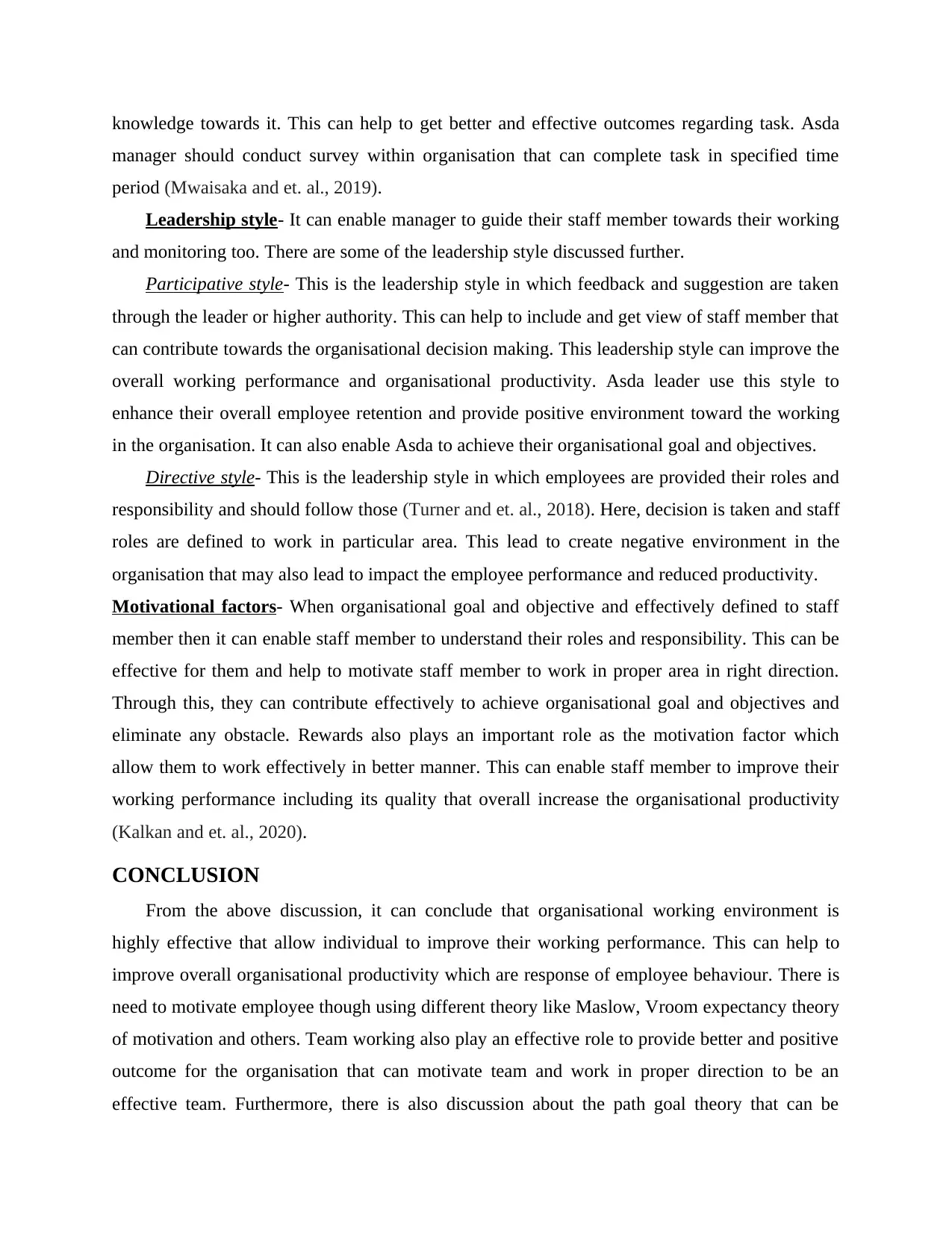
knowledge towards it. This can help to get better and effective outcomes regarding task. Asda
manager should conduct survey within organisation that can complete task in specified time
period (Mwaisaka and et. al., 2019).
Leadership style- It can enable manager to guide their staff member towards their working
and monitoring too. There are some of the leadership style discussed further.
Participative style- This is the leadership style in which feedback and suggestion are taken
through the leader or higher authority. This can help to include and get view of staff member that
can contribute towards the organisational decision making. This leadership style can improve the
overall working performance and organisational productivity. Asda leader use this style to
enhance their overall employee retention and provide positive environment toward the working
in the organisation. It can also enable Asda to achieve their organisational goal and objectives.
Directive style- This is the leadership style in which employees are provided their roles and
responsibility and should follow those (Turner and et. al., 2018). Here, decision is taken and staff
roles are defined to work in particular area. This lead to create negative environment in the
organisation that may also lead to impact the employee performance and reduced productivity.
Motivational factors- When organisational goal and objective and effectively defined to staff
member then it can enable staff member to understand their roles and responsibility. This can be
effective for them and help to motivate staff member to work in proper area in right direction.
Through this, they can contribute effectively to achieve organisational goal and objectives and
eliminate any obstacle. Rewards also plays an important role as the motivation factor which
allow them to work effectively in better manner. This can enable staff member to improve their
working performance including its quality that overall increase the organisational productivity
(Kalkan and et. al., 2020).
CONCLUSION
From the above discussion, it can conclude that organisational working environment is
highly effective that allow individual to improve their working performance. This can help to
improve overall organisational productivity which are response of employee behaviour. There is
need to motivate employee though using different theory like Maslow, Vroom expectancy theory
of motivation and others. Team working also play an effective role to provide better and positive
outcome for the organisation that can motivate team and work in proper direction to be an
effective team. Furthermore, there is also discussion about the path goal theory that can be
manager should conduct survey within organisation that can complete task in specified time
period (Mwaisaka and et. al., 2019).
Leadership style- It can enable manager to guide their staff member towards their working
and monitoring too. There are some of the leadership style discussed further.
Participative style- This is the leadership style in which feedback and suggestion are taken
through the leader or higher authority. This can help to include and get view of staff member that
can contribute towards the organisational decision making. This leadership style can improve the
overall working performance and organisational productivity. Asda leader use this style to
enhance their overall employee retention and provide positive environment toward the working
in the organisation. It can also enable Asda to achieve their organisational goal and objectives.
Directive style- This is the leadership style in which employees are provided their roles and
responsibility and should follow those (Turner and et. al., 2018). Here, decision is taken and staff
roles are defined to work in particular area. This lead to create negative environment in the
organisation that may also lead to impact the employee performance and reduced productivity.
Motivational factors- When organisational goal and objective and effectively defined to staff
member then it can enable staff member to understand their roles and responsibility. This can be
effective for them and help to motivate staff member to work in proper area in right direction.
Through this, they can contribute effectively to achieve organisational goal and objectives and
eliminate any obstacle. Rewards also plays an important role as the motivation factor which
allow them to work effectively in better manner. This can enable staff member to improve their
working performance including its quality that overall increase the organisational productivity
(Kalkan and et. al., 2020).
CONCLUSION
From the above discussion, it can conclude that organisational working environment is
highly effective that allow individual to improve their working performance. This can help to
improve overall organisational productivity which are response of employee behaviour. There is
need to motivate employee though using different theory like Maslow, Vroom expectancy theory
of motivation and others. Team working also play an effective role to provide better and positive
outcome for the organisation that can motivate team and work in proper direction to be an
effective team. Furthermore, there is also discussion about the path goal theory that can be
⊘ This is a preview!⊘
Do you want full access?
Subscribe today to unlock all pages.

Trusted by 1+ million students worldwide
1 out of 15
Related Documents
Your All-in-One AI-Powered Toolkit for Academic Success.
+13062052269
info@desklib.com
Available 24*7 on WhatsApp / Email
![[object Object]](/_next/static/media/star-bottom.7253800d.svg)
Unlock your academic potential
Copyright © 2020–2026 A2Z Services. All Rights Reserved. Developed and managed by ZUCOL.



